

-- The remains of 117 Chinese soldiers killed in the 1950-53 Korean War were returned to China on Sunday from ROK.
-- Seventy years ago, the Chinese People's Volunteers (CPV) crossed the Yalu River and fought alongside the army of the Democratic People's Republic of Korea against the ROK army and U.S.-led UN forces, eventually winning the War to Resist U.S. Aggression and Aid Korea in 1953.
-- A total of 2.9 million CPV soldiers entered the battlefield, and 197,653 of them sacrificed their lives in the war.
SHENYANG, Sept. 27 (Xinhua) -- The remains of 117 Chinese soldiers killed in the 1950-53 Korean War were returned to China on Sunday from the Republic of Korea (ROK).
Escorted by two Chinese fighter jets, an air force plane carrying the remains and belongings of the fallen soldiers landed at the Taoxian international airport in Shenyang, capital of northeast China's Liaoning Province, at 11:18 a.m.
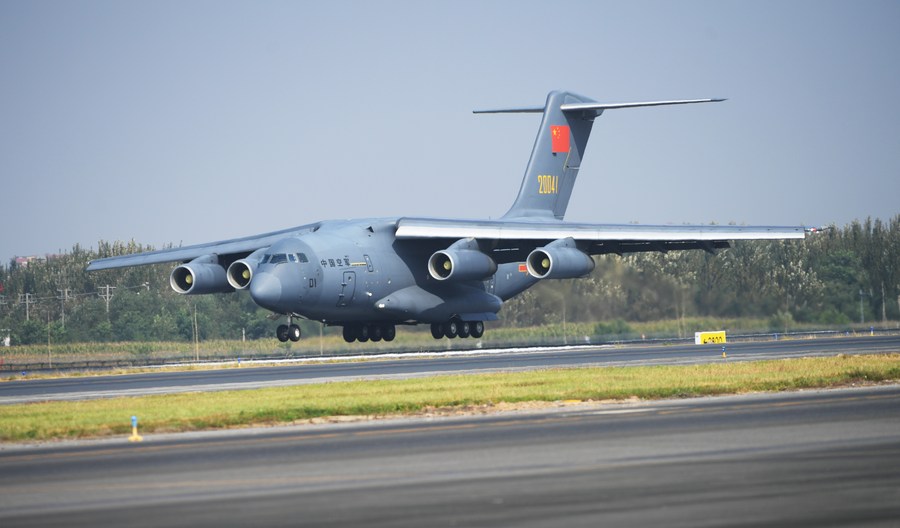
Escorted by two Chinese fighter jets, an air force plane carrying the remains and belongings of the fallen soldiers landed at the Taoxian international airport in Shenyang, capital of northeast China's Liaoning Province, at 11:18 a.m. (Xinhua/Yang Qing)
It is the seventh such repatriation following a handover agreement signed by the two countries.
The remains were casketed in the ROK on Saturday at a ceremony held at a provisional morgue of the 17th army division of the ROK in Incheon, west of the capital Seoul.
Personal seals of three martyrs -- Ma Shixian, Lin Shuishi and Ding Zuxi -- were found among the soldiers' belongings, providing clues to confirm the identities of the heroes and find their relatives.
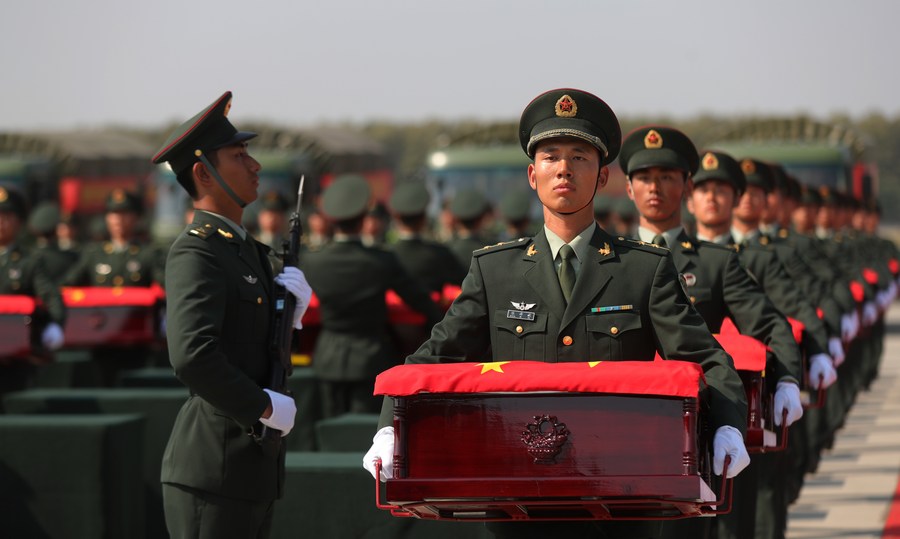
Caskets containing the remains of 117 Chinese soldiers killed in the 1950-53 Korean War are escorted by honor guards at the Taoxian international airport in Shenyang, northeast China's Liaoning Province, Sept. 27, 2020. The remains of 117 Chinese soldiers killed in the 1950-53 Korean War were returned to China on Sunday from the Republic of Korea (ROK).(Xinhua/Yang Qing)
"Most of them are unknown martyrs. 'Hero' is their shared name," said Li Hanxiang, a veteran who fought in the Korean War, at a ceremony held at the airport to welcome the martyrs home.
"My father was also a martyr, sacrificed in the Korean War. Seeing the remains of these soldiers return is like seeing my father," said Zhu Jiangbo, who came to the airport early in the morning to welcome the heroes home. "The motherland and the people will never forget them."
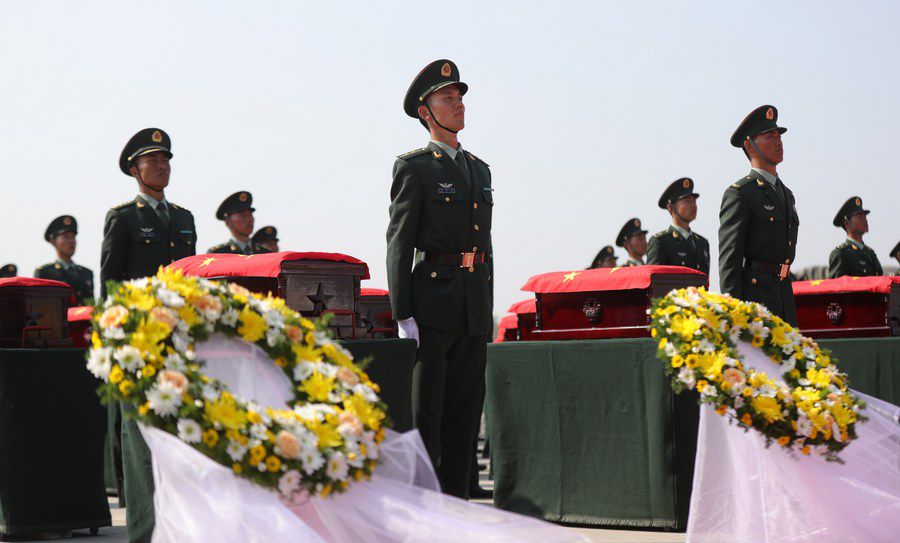
Caskets containing the remains of 117 Chinese soldiers killed in the 1950-53 Korean War are escorted by honor guards at the Taoxian international airport in Shenyang, northeast China's Liaoning Province, Sept. 27, 2020. The remains of 117 Chinese soldiers killed in the 1950-53 Korean War were returned to China on Sunday from the Republic of Korea (ROK).(Xinhua/Yang Qing)
Seventy years ago, the Chinese People's Volunteers (CPV) crossed the Yalu River and fought alongside the army of the Democratic People's Republic of Korea against the ROK army and U.S.-led UN forces, eventually winning the War to Resist U.S. Aggression and Aid Korea in 1953.
"Why did we win the war? Because we, brave soldiers fearing no sacrifice, were fighting for justice and peace," said Wang Liping, an 89-year-old CPV veteran.

An honor guard covers a casket containing the remains of the Chinese People's Volunteers (CPV) martyr with national flag at the Taoxian international airport in Shenyang, northeast China's Liaoning Province, Sept. 27, 2020. The remains of 117 Chinese soldiers killed in the 1950-53 Korean War were returned to China on Sunday from the Republic of Korea (ROK).(Xinhua/Yang Qing)
A total of 2.9 million CPV soldiers entered the battlefield, and 197,653 of them sacrificed their lives in the war. The names of the martyrs can be found on a memorial wall at the CPV martyrs' cemetery in Shenyang.
"We never thought of coming back. Every soldier was determined to defend the country with their life. Today, they finally returned home," said 88-year-old Li Weibo, who operated anti-aircraft artillery during the war.
Most of the martyrs returning home this time are unknown heroes. "Although we don't know their names, we once fought side by side. They are all my comrades-in-arms, friends, and family," Li said.
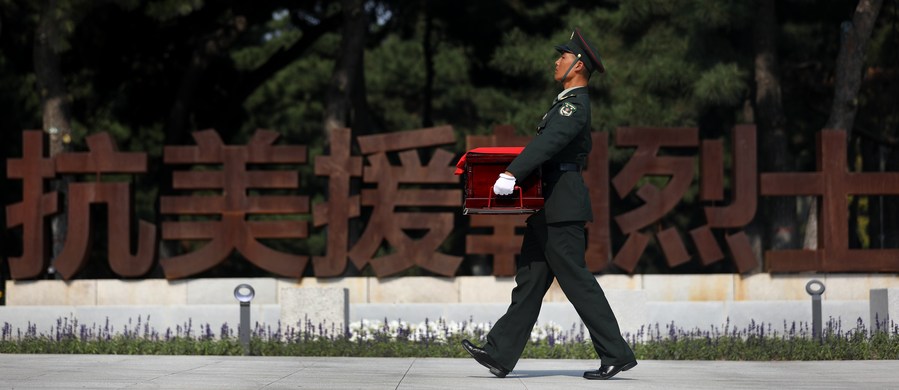
A casket containing the remains of the Chinese People's Volunteers (CPV) martyr is escorted to the CPV martyrs' cemetery in Shenyang, northeast China's Liaoning Province, Sept. 27, 2020. The remains of 117 Chinese soldiers killed in the 1950-53 Korean War were returned to China on Sunday from the Republic of Korea (ROK).(Xinhua/Yao Jianfeng)
The remains will be buried in the CPV martyrs' cemetery in Shenyang, with a burial ceremony due to be held on Monday. The remains of 599 soldiers returned from the ROK were buried there between 2014 and 2019.
Cemetery staff have registered more than 5,000 items that were returned together with the previous six groups of remains, and have established electronic files.
In 2019, with the help of DNA technology, China successfully identified six of the unknown martyrs and found their families.
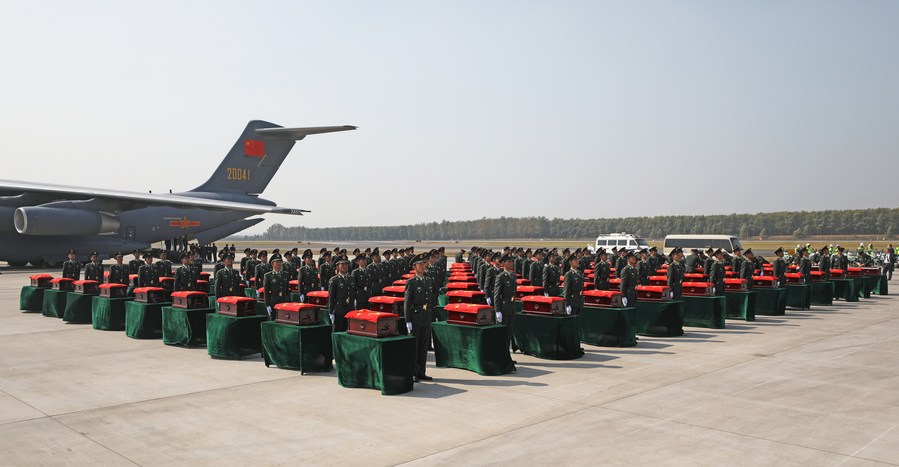
Caskets containing the remains of the Chinese People's Volunteers (CPV) martyrs are escorted by honor guards at the Taoxian international airport in Shenyang, northeast China's Liaoning Province, Sept. 27, 2020. (Xinhua/Yang Qing)
"The great spirit of CPV soldiers is the precious wealth of the Chinese people. Heroes will never die but always live in the hearts of the motherland and the people," said Liu Kai, son of CPV martyr Liu Tianzeng.
"We have to remember the war in order to safeguard peace and tell the world that a people, daring to rise up and fight for the glory, independence and security of its motherland, is invincible," said Zou Jiliang, a CPV veteran.

 Award-winning photos show poverty reduction achievements in NE China's Jilin province
Award-winning photos show poverty reduction achievements in NE China's Jilin province People dance to greet advent of New Year in Ameiqituo Town, Guizhou
People dance to greet advent of New Year in Ameiqituo Town, Guizhou Fire brigade in Shanghai holds group wedding
Fire brigade in Shanghai holds group wedding Tourists enjoy ice sculptures in Datan Town, north China
Tourists enjoy ice sculptures in Datan Town, north China Sunset scenery of Dayan Pagoda in Xi'an
Sunset scenery of Dayan Pagoda in Xi'an Tourists have fun at scenic spot in Nanlong Town, NW China
Tourists have fun at scenic spot in Nanlong Town, NW China Harbin attracts tourists by making best use of ice in winter
Harbin attracts tourists by making best use of ice in winter In pics: FIS Alpine Ski Women's World Cup Slalom
In pics: FIS Alpine Ski Women's World Cup Slalom Black-necked cranes rest at reservoir in Lhunzhub County, Lhasa
Black-necked cranes rest at reservoir in Lhunzhub County, Lhasa China's FAST telescope will be available to foreign scientists in April
China's FAST telescope will be available to foreign scientists in April